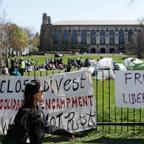How will the $789 billion stimulus package affect you?
WASHINGTON -- The $789 billion stimulus bill moving toward final passage by Congress will not quickly solve the historic problems besetting the economy, but it could reduce the damage, while providing relief for the unemployed and the uninsured.
Nariman Behravesh, chief economist at IHS Global Insight, predicts the biggest effects will occur in 2010 from the bill's spending for aid to state and local governments and on infrastructure such as roads, bridges, transit and other areas.
Moody's Economy.com chief economist Mark Zandi says the bill could help end the economic slide. He warns, however, that the stimulus spending will likely be too small, given the size of the economic decline, and suggests Congress may have to revisit the issue.
The non-partisan Congressional Budget Office says the bill could increase employment in a range of 800,000 to 2.3 million jobs by the fourth quarter of 2009 and 1.2 million to 3.6 million by the fourth quarter of 2010.
HOUSING/CARS: Buyers could get a modest break
If you're in the market for a new car or your first house, the compromise stimulus bill offers modest tax breaks for both kinds of purchases.
First-time home buyers would receive an $8,000 tax credit, and they wouldn't have to repay the government later as is required for the current $7,500 credit. An earlier Senate proposal would have provided all home buyers with a $15,000 credit.
"The home buyer tax credit is a plus for the housing market, but only a small plus," says Mark Zandi of Moody's Economy.com. "The credit … covers only a part of the down payment needed to make a purchase. The housing market will take any help it can get, but it needs more."
Other economists point out that the tax credit will still provide a mild jolt to the market by encouraging home purchases, which in turn should help curb the rapid rate of home price declines.
"While scaled back somewhat, it is still a good idea," says Brian Bethune at IHS Global Insight. "It should induce more home sales in 2009, and this will be an important support for the housing market and the housing industry. It should also buffer the rate of decline of home prices."
The bill also would allow new car buyers to deduct the purchase's sales tax from taxable income.
"We're happy to see the sales tax help, but credit is really the big issue," Chrysler President Jim Press said Thursday in Chicago.
"Ever-increasing credit score requirements by lenders," and slipping consumer credit ratings take many potential buyers out of the pool, Press said.
"A positive development, but we don't think it would have an immediate impact on the market," said Chris Hosford, vice president at Hyundai's U.S. operations.
The average new car purchase price the first 11 months of last year was $28,280, and the average used car trade-in value was $15,203, according to data from the National Automobile Dealers Association. Paul Taylor, NADA chief economist, says states typically tax the difference — $13,077 in this case.




